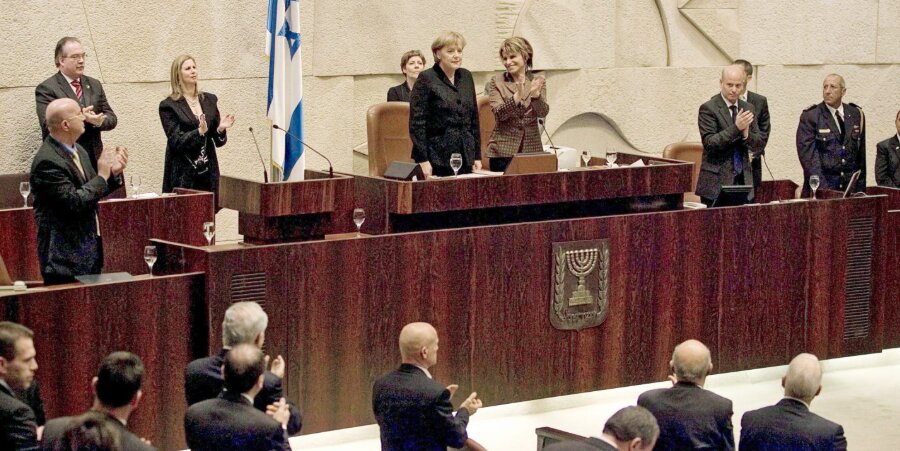Merkel’s legacy: Building strong Israel-Germany ties in the 21st century

TEHRAN - Over the past two decades, Israel-Germany relations have evolved from a partnership based on Holocaust remembrance into a robust strategic alliance.
Since the early 2000s, military and intelligence cooperation has intensified, with Germany becoming Israel’s leading European trading partner and key defense supplier.
Under Angela Merkel, Israel’s security became part of Germany’s “reason of state,” and joint cabinet meetings and diplomatic support deepened ties. Despite policy differences, shared democratic values and economic, security, and global initiatives have made their alliance one of the most vital in Europe and the Middle East.
Deepening military and diplomatic cooperation in the 2000s
In the early 2000s, Germany-Israel relations experienced significant growth, particularly in military and diplomatic spheres. Germany emerged as a crucial supplier of advanced military technology to Israel, notably providing Dolphin-class submarines and collaborating on sensitive projects like the secret development of a nuclear early-warning system (Operation Bluebird), reflecting deep strategic trust.
Diplomatically, 2000 marked a milestone with Chancellor Gerhard Schroder’s visit to Israel, symbolizing stronger bilateral ties. Germany played a key mediating role in prisoner exchanges, most notably in 2004 when its intelligence agency (BND) successfully brokered a high-profile swap, earning public praise from Israeli Prime Minister Ariel Sharon.
During the 2006 Israel-Lebanon conflict, Germany further demonstrated its commitment by negotiating for the release of Israeli soldiers captured by Hezbollah, at the request of Israeli officials. Israeli leaders even considered the prospect of a German military presence in Lebanon, highlighting the growing trust and depth of cooperation between the two nations.
The Angela Merkel era: A unique alliance and pragmatic support
Angela Merkel’s tenure as German chancellor (2005–2021) marked a transformative era in Berlin-Tel Aviv relations, defined by exceptional closeness and diverse cooperation.
Merkel visited Israel seven times and, in 2008, became the first German chancellor to address the Knesset, where she unequivocally affirmed Germany’s historical responsibility and commitment to Israel’s security as a non-negotiable principle.
She described the relationship as a “precious treasure” to be preserved for future generations, blending moral responsibility with pragmatic, forward-looking partnership and embedding support for Israel into Germany’s core foreign policy values.
Under her leadership, military cooperation intensified, with Germany providing advanced weaponry and participating in joint exercises such as the 2017 Blue Flag drill, symbolizing deep strategic trust.
Intelligence sharing and security collaboration also expanded, further solidifying the partnership. Diplomatically, Merkel consistently backed Israel in international forums while advocating a two-state solution, embodying a “consensus for disagreement” that recognized both Israel’s security needs and the complexity of the Israeli-Palestinian conflict.
Her personal approach and political integrity earned widespread respect in Israel, with leaders praising her combination of steadfast support and genuine warmth. Merkel’s legacy endures as a model of balanced, pragmatic, and historically conscious German-Israeli relations.
Challenges and shifts in the 2010s and early 2020s
Despite strong ties, the 2010s introduced new complexities. Germany’s increasing alignment with the European Union’s collective Middle East policy led to a “Europeanization” of its stance toward Israel.
This shift involved more open criticism of Israeli settlement policies and greater emphasis on international law and human rights, somewhat diluting the special bilateral character of the relationship.
Generational changes in both countries also influenced the dynamic, with younger Germans and Israelis engaging more through cultural and educational exchanges, moving somewhat away from the historical guilt framework that had long underpinned the relationship.
This evolution sparked debates about the appropriate limits of criticism and the role of historical memory in shaping contemporary relations.
Strategic divergences emerged, particularly over Iran’s nuclear program and regional security issues. Germany’s participation in the Iran nuclear deal contrasted with Israel’s more hardline stance, revealing gaps in threat perception and policy.
German officials publicly questioned aspects of Israel’s long-term approach to the Palestinian conflict, with Foreign Minister Sigmar Gabriel in 2018 urging clearer Israeli policies and renewed efforts toward coexistence.
Over time, Germany-Israel relations have moved beyond their historical roots, evolving into a complex and pragmatic alliance shaped by shared interests and shifting global dynamics. Yet, human rights concerns, shifting generational attitudes, and diverging regional policies have begun to challenge this foundation
While Germany continues to affirm Israel’s security as a core policy, generational shifts and international criticism of Israeli actions, especially after October 7, 2023, are testing the limits of this alliance. As debates intensify around justice, international law, and ethical foreign policy, the next phase of German-Israeli ties will depend on whether values or political expediency take precedence.
Leave a Comment